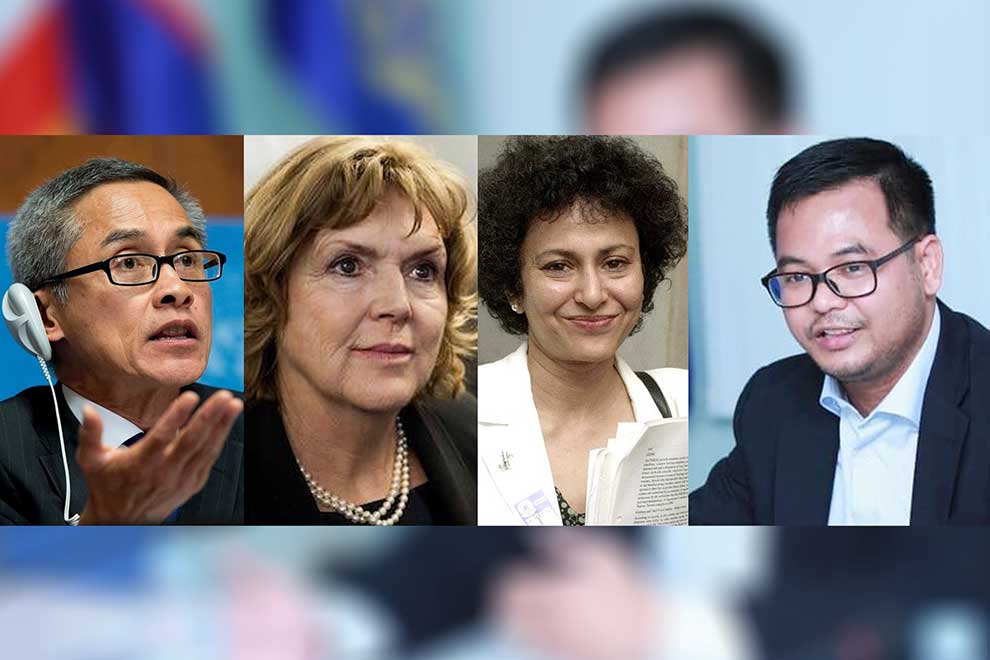
(From left to right) Vitit Muntarbhorn, Mary Lawlor, Irene Khan and Chin Malin. UN SPECIAL RAPPORTEURS, CHIN MALIN
Ministry of Justice spokesman Chin Malin rebuffed claims by three UN human rights experts who have accused the Cambodian government of using the courts to persecute rights defenders.
The trio of UN experts who made the statements were special rapporteur on human rights in Cambodia Vitit Muntarbhorn; special rapporteur on the promotion and protection of the right to freedom of opinion and expression Irene Khan; and special rapporteur on the situation of human rights defenders Mary Lawlor.
Malin said that based on all human rights principles that he is aware of, there is nothing wrong with prosecuting those who perpetrate crimes as long as it is done in a manner consistent with the law and they are treated fairly and equally because human rights in a democratic society depend on consistently upholding the rule of law.
“Prosecutions of criminals in accordance with all standard legal procedures and a clear legal basis as well as a basis in fact cannot be considered as unjust restrictions on their freedoms.
“Nor can it somehow be viewed as the persecution of legitimate political opposition voices, because those who engage in criminal activity to advance their political agendas are not and cannot be viewed as legitimate.
“Prosecution and persecution are spelled similarly but the meanings of those two terms differ considerably should the rapporteurs care to check a dictionary,” Malin said.
Following the convictions of 15 “human rights defenders” and political activists in two separate criminal cases recently, the three UN rights experts issued statements highly critical of the Cambodian authorities for what they said was the “weaponising” of Cambodia’s courts to methodically reduce the scope of the citizenry’s political activities.
The UN trio called on the government to change course and protect the freedom of expression.
“We are extremely troubled by the verdicts, which again reaffirm the methodical and systematic erosion of civic and political space in Cambodia.
“We are truly alarmed that the courts are again being weaponised to silence any form of dissent, including peaceful activism that is protected under the rights to freedom of expression.”
The UN experts’ remarks were in response to the October 26 convictions of seven human rights and environmental activists affiliated with the so-called Khmer Thavrak and Khmer Student Intelligent League Association – Chhoeun Daravy, Hun Vannak, Koet Saray, Tha Lavy, Eng Malai, Muong Sopheak, and Mean Prommony – all arrested in two separate incidents last year and each sentenced to 20-month prison terms and fined $500 for incitement to commit a felony or cause social chaos.
The UN officials called on the government to take immediate steps to safeguard Cambodia’s civic and democratic space by implementing their recommendations, which the government already accepted at the 2019 Universal Periodic Review.
Nevertheless, Malin explained that activities that violate the law are not an exercise of free speech in accordance with Cambodia’s laws and culture and these disruptive political stunts by fringe groups and youths should not be encouraged or offered protection.
“The enforcement of the law based on Cambodian legal procedures as carried out in Cambodian courts is the basic foundation of our democratic society and can’t just be ignored or else we have rejected rather than embraced the rule of law,” he said.
The UN experts also expressed their concerns about the conviction of a 16-year-old on November 1 on charges of incitement and insulting public officials.
He was sentenced to eight months in prison but is expected to be released soon since about half of his sentence was suspended pending the completion of two years of probation under judicial supervision and the other half was already completed in pre-trial detention.
The 16-year-old – Kak Sovanchhai – is the son of a former member of the Supreme Court-dissolved Cambodia National Rescue Party (CNRP) who is also serving time in prison currently.
“The conviction of a minor with an autism spectrum disorder is a shameful nadir in the authorities’ continuing campaign of intimidation and violence against civil society and opposition activists and affiliates.
“We see the conviction and the conditions imposed on his liberty as a very transparent attempt by the authorities to prevent his mother from demonstrating for the release of her husband,” the UN experts’ statements said.
The Phnom Penh Municipal Court on November 4 issued a press statement to clarify the situation, stating he will be released on November 8 and will be back home living with his mother following the four months and 15 days already spent in pre-trial detention.
The statement said Sovanchhai had committed these same crimes in the past and was warned and educated on the matter by the authorities, who were lenient with him because it was his first offence and due to his age.
Unfortunately, they said, Sovanchhai did not correct his behaviour and repeated these mistakes and that landed him back in court again.
“The claim that the boy has autism is just a personal claim without any basis in evidence such as a medical certificate or medical records – not even a note from a doctor.
“The court had a doctor give him a physical examination which determined he was in good health. We then interviewed him to gauge his general understanding of what was occurring and why. His answers were normal and reasonably intelligent – just like any other adolescent his age – and we could find no evidence of any of the psychological or developmental disabilities his family claims he has,” the court said.








